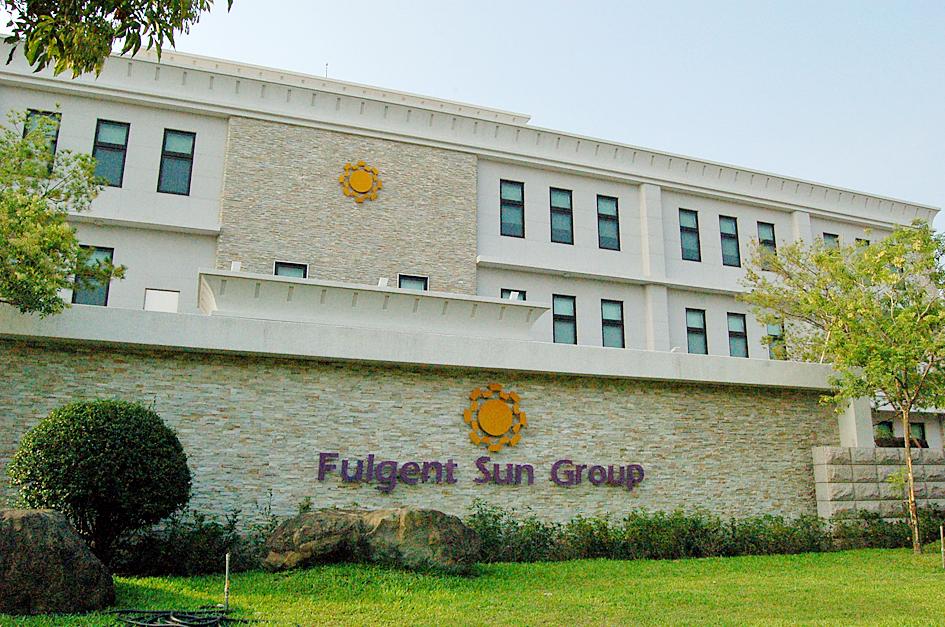Fulgent Sun International Holding Co (鈺齊國際), which supplies sports shoes and functional outdoor shoes to global brands, yesterday posted consolidated revenue of NT$1.375 billion (US$48.4 million) for last month, up 29.28 percent from NT$1.064 billion a year earlier and its highest-ever for January.
Fulgent in a statement attributed the increase to robust orders for spring and summer shoes, which the company started shipping in October last year.
SHIPPING DISRUPTIONS

Photo: Liao Shu-ling, Taipei Times
While last month’s revenue was less than the record-high sales of NT$1.47 billion it made in December, and a global shortage of cargo containers has disrupted its shipping, the company said it remains optimistic about its order outlook through April and May.
“Under the customized [order-based] production mode, brand customers have continued to book orders to meet the needs of their distributors in various regions,” Fulgent said in the statement.
Fulgent is headquartered in Yunlin County’s Douliou City (斗六) and has six production bases overseas: three in China, two in Vietnam and one in Cambodia.
The company on Jan. 20 reported net profit of NT$186.88 million for the fourth quarter of last year, down 49.7 percent from NT$371.42 million a year earlier. Earnings per share were NT$1.01, down from NT$2.14 a year ago.
Net profit for the full year was NT$897.58 million, down 29.8 percent from NT$1.28 billion in 2019. Earnings per share were NT$5.06 per share, compared with NT$7.81 a year earlier.
Aggregate revenue decreased 11.7 percent annually to NT$11.35 billion from NT$12.84 billion, data showed.
UPGRADING
As the COVID-19 pandemic has raised consumer health awareness and drawn attention to outdoor recreation, Fulgent said it has steadily increased production capacity, accelerated manufacturing automation and sped up new product development to meet rising customer demand.

With this year’s Semicon Taiwan trade show set to kick off on Wednesday, market attention has turned to the mass production of advanced packaging technologies and capacity expansion in Taiwan and the US. With traditional scaling reaching physical limits, heterogeneous integration and packaging technologies have emerged as key solutions. Surging demand for artificial intelligence (AI), high-performance computing (HPC) and high-bandwidth memory (HBM) chips has put technologies such as chip-on-wafer-on-substrate (CoWoS), integrated fan-out (InFO), system on integrated chips (SoIC), 3D IC and fan-out panel-level packaging (FOPLP) at the center of semiconductor innovation, making them a major focus at this year’s trade show, according

DEBUT: The trade show is to feature 17 national pavilions, a new high for the event, including from Canada, Costa Rica, Lithuania, Sweden and Vietnam for the first time The Semicon Taiwan trade show, which opens on Wednesday, is expected to see a new high in the number of exhibitors and visitors from around the world, said its organizer, SEMI, which has described the annual event as the “Olympics of the semiconductor industry.” SEMI, which represents companies in the electronics manufacturing and design supply chain, and touts the annual exhibition as the most influential semiconductor trade show in the world, said more than 1,200 enterprises from 56 countries are to showcase their innovations across more than 4,100 booths, and that the event could attract 100,000 visitors. This year’s event features 17

SEMICONDUCTOR SERVICES: A company executive said that Taiwanese firms must think about how to participate in global supply chains and lift their competitiveness Taiwan Semiconductor Manufacturing Co (TSMC, 台積電) yesterday said it expects to launch its first multifunctional service center in Pingtung County in the middle of 2027, in a bid to foster a resilient high-tech facility construction ecosystem. TSMC broached the idea of creating a center two or three years ago when it started building new manufacturing capacity in the US and Japan, the company said. The center, dubbed an “ecosystem park,” would assist local manufacturing facility construction partners to upgrade their capabilities and secure more deals from other global chipmakers such as Intel Corp, Micron Technology Inc and Infineon Technologies AG, TSMC said. It

EXPORT GROWTH: The AI boom has shortened chip cycles to just one year, putting pressure on chipmakers to accelerate development and expand packaging capacity Developing a localized supply chain for advanced packaging equipment is critical for keeping pace with customers’ increasingly shrinking time-to-market cycles for new artificial intelligence (AI) chips, Taiwan Semiconductor Manufacturing Co (TSMC, 台積電) said yesterday. Spurred on by the AI revolution, customers are accelerating product upgrades to nearly every year, compared with the two to three-year development cadence in the past, TSMC vice president of advanced packaging technology and service Jun He (何軍) said at a 3D IC Global Summit organized by SEMI in Taipei. These shortened cycles put heavy pressure on chipmakers, as the entire process — from chip design to mass